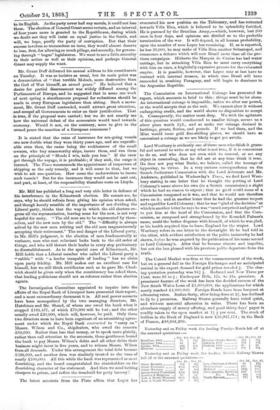Lord Westbury is evidently one of those men who think
it grace- ful and natural to write or say what is not true, if it is convenient to do so, and who does not even •wish to conceal, or see any object in concealing, that he did net at any time think it true. He does not pay what Burke, we believe, called the homage-of hypocrisy, to virtue. In a very curious correspondence on the Scotch Judicature Commission with the Lord Advocate and Mr. Anderson, published in Wednesday's Times, we find Lord West- bury stating in one letter that he thought the putting of Lord Colonsay's name above his own (in a Scotch commission) a slight which he had no reason to expect ; that no good could some of a Commission composed as.it was, and that he would •not therefore serve on it ; and •in another letter that he had the greatest respect and regard for Lord Colonsay ; that he was "glad of the decision "st which in another letter he says he was "much surprised and grieved" to put him at the head of the Commission, and that the Com- mission, so composed and strengthened by Sir Roundell Palmer's name, could the better dispense with himself, of which he was glad, as his health required him to leave England for the vriqter. Lord Westbury refers in one letter to the downright fib he had told in the other, with evident satisfaction at the polite insincerity he had shown, before he was angered by the publication of his name second to Lord Colonsay's. After that he became sincere and
but not the less pleased with his previous polite departure from the truth.


































 Previous page
Previous page